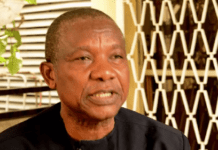(By Adebayo Oladejo)
It was a gathering of who is who in the society as the Pharmaceutical Society of Nigeria (PSN), Osun State chapter, had its first ‘Pharmacy Summit’. The programme served as a forum for all pharmacists in the state to meet and identify the problems in their various practices, proffer solutions and seek ways to deliver safe medicines in their environment, and Osun State generally. It was held at the newly completed ultra-modern hall of the association, located at plot 23, GRA, behind African Church Grammar School, Gbongan Road, Osogbo, Osun State.
The summit with the theme “Safe Medicines – The Challenges of Meeting its Delivery in Osun State” had in attendance personalities such as Senator Ayo Fasanmi, an octogenarian pharmacist and one time president, Pharmaceutical Society of Nigeria, who was the father of the day; Professor Adebayo Lamikanra, Faculty of Pharmacy, Obafemi Awolowo University (OAU), Ile Ife, Osun State, chairman of the occasion; Pharm. Gbenga Falabi, general manager, Greenlife Pharmaceuticals, the guest pharmacist; Pharm. Adebayo Ismail Olufemi, national chairman, Association of Community Pharmacists of Nigeria (ACPN); Pharm. Leke Ogunsola, chairman, Committee on Health, Osun State House of Assembly; Prof.Olusheye Bolaji, dean, Faculty of Pharmacy, OAU; Pharm. Sam Adekola, PSN chairman, Ondo State, the keynote address speaker; Pharm. Bambo Akinbile, PSN chairman, Osun State; Pharm. Michael Bayo Eniola; Pharm.(Mrs) Adepeju Ojo; Dr. Moses Akanni; Pharm. Akin Ayinde Fashipe; Pharm. Siji Olamiju, head of pharmacy, OAU Teaching Hospital; Pharm. Rasak Saliu, secretary, PSN, Osun State and Pharm. Adesoye Oladejo, among others.
While delivering his keynote address, titled “Safe Medicine – The Challenges of Implementation in the State of Osun” Pharm. Sam Adekola, who defined safety as freedom from danger or risk of harm or injury, however disclosed that no medicine is absolutely safe, and that every drug or medicine has two inherent features of benefits and risks.
According to him, the decision of drugs utilisation is based on a balance of probability that the benefits of use outweigh the risks. He added that the harm derivable from drugs varies from one agent to another, and that it is upon this risk stratification that national and international laws classify medicines into two main groups namely: ‘over-the-counter‘(OTC) medicines and prescription only medicines (POM).
Speaking on adverse drug reaction and drug induced diseases, Pharm. Adekola disclosed that medicines affect the human body and the human body also affects consumed medicines. “Though medicines are consumed for their benefits, what they do to the body can be harmful, since medicines are not constituents of the body. Adverse reactions to drugs can mimic every disease known to man.”
“Drugs must always be considered as a possible cause of disease or symptoms patients complain of. Complete drugs histories, including non-prescription drugs and herbal remedies, must also be carried out. Adverse Drug Reactions (ADRs) –the WHO defines ADRs as any response to a drug which is noxious (harmful) and unintended, and which occurs at doses used in man for prophylaxis, diagnosis or therapy. The reaction is directly associated with the use of the medicinal agent.”
The Ondo State PSN boss also disclosed that 57 countries, 36 of which are in sub-Saharan Africa, have a health workforce crisis, adding that human resources for health crisis is a threat to the delivery of health services and the attainment of the Millennium Development Goals. “Many countries continue to experience shortages of pharmacists and marked urban-rural distribution imbalances, despite general increases in pharmacy workforce levels over time. Meanwhile, only six local governments in the whole of Osun State have registered community pharmacies.”
Adekola further said that safe medicines, as a concept, is beyond just a capsule or tablet being dispensed to a patient but can be summarised as “the right drug in the right form, at the right dose to the right patient, at the right time in the right manner, which cannot be achieved without the interface of the appropriately trained professionals.
“For a state like ours in Osun, with population of over 3.4 million people (2006 census), to have just about 200 active pharmacists with average number of 80 community pharmacies means that the target for safe medicines to be sourced from the right person and place is a daunting task.The government, at both state and federal levels, should work on introducing more pharmacy schools, so that a critical mass of pharmacists is available to the masses.”
He also advised that there is a critical need for government to come up with and implement plans to ensure that an ideal number of pharmacists to people ratio is achieved, while gradually phasing out the patent medicine scheme. He added that the panacea to safe medicines is the right sources, which are the pharmacists-manned pharmacies.
In a related development, Prof Adebayo Lamikanra, who was the chairman of the occasion, said the struggle to have safe medicine cannot be achieved, as the words‘ safe medicine’ to him are like an oxymoron. According to him, drugs can only be safe when they are of the right quality and are used in a controlled manner and when pharmacists are ready to take up the responsibility of reducing whatever dangers drugs pose to the body of those that use them.
“Pharmacists should be well equipped, well informed and up to date with happenings in the profession and must have confidence to deliver their responsibility. Let me tell you, getting a B.Pharm or Pharm. D from university alone cannot make one a successful pharmacist; they are just the beginning. Drugs cannot be safe in an environment where we have a bunch of unsaved pharmacists, so the task is on us to help the society.”
While speaking, Senator Ayo Fasanmi, who gave elderly advice to all the pharmacists in the state said that they should endeavour to see the pharmacy profession as their primary constituency, and work tirelessly to ensure that the profession moves forward. He added that the summit would harmonise individual differences among pharmacists in the state and take the profession to the next level.
“Pharmacy is a noble profession and, as men of honour, we should join hands together to take the profession to an enviable position in the state. I am very glad for what pharmacy has done for me and I have been privileged to serve the Pharmaceutical Society of Nigeria at both the state and national level; and I have no other constituency aside from pharmacy.”
Speaking earlier with Pharmanews in an interview, Pharm. Adebambo Akinbile, the PSN chairman, Osun State, said the summit was a dream which has come to reality. He revealed that the motive behind the summit, which was the first in the history of the state, was to allow all pharmacists in the state to sit together, irrespective of their technical group, and see how differences that exist among them can be harnessed together, in order to become a position of strength for the association.
“Instead of doing things in our individual ways by saying ‘I am a community pharmacist and you are a hospital pharmacist’, we should come together, pour out our grievances, share our ideas, bring out suggestions and deliberate, so that pharmacy practice in the state would be different.”
Asked about the challenge of unsafe medicines in the state, he said the challenge is not different from every other state. He explained that the challenge borders on the chaotic drug distribution network, which according to him is hampering the progress of pharmacy practice safe medicine in the country.
“If we can have a situation whereby drugs would come from the manufacturers, get to the wholesalers, and from there to the retailers, issues like fake and counterfeit medicines would have been a forgotten issue, but the reverse is the case. Companies now dump their products in markets, and when you go to markets like Idumota and Onitsha, you will feel sorry for this country.
“So, the issue of fake medicines is very important to us in Osun State; and we would be very happy, if the government can correct the chaotic drug distribution system, and enforce laws that forbid people that are not trained in the aspect of handling drugs from practicing pharmacy. People have regarded drug selling as mere trade, and now everybody wants to sell drugs because they feel there is money there. Also, at the end of our deliberations today, we are going to issue a communiqué, which would be sent to the national body, and tell them that this is what we agreed on in our state. And we feel they should look at it very well, and if it is worthwhile, they should implement it at the national level.”
Meanwhile, the technical arms of the Pharmaceutical Society of Nigeria, Osun State chapter, who were present at the summit include: Association of Community Pharmacists of Nigeria (ACPN), Osun State Branch; Association of Industrial Pharmacists of Nigeria (AIPN), Osun State Branch; Association of Lady’s Pharmacists (ALPs), Osun State Branch; National Association of Hospital and Administrative Pharmacists (NAHAP), Osun State Branch and National Association of Pharmacists in Academia (NAPA), Osun State branch, as well as their leaders.














pills without a doctor prescription: https://genericwdp.com/ generic drugs without doctor’s prescription
tadalafil 40 mg from india: http://tadalafilonline20.com/ generic tadalafil 40 mg